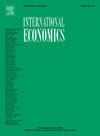Do natural disasters translate into trade disasters?
引用次数: 0
Abstract
This paper empirically investigates the relationship between natural disasters and agricultural trade for a sample of 187 countries during the period of 1991–2019. To this end, we estimate a theory-grounded gravity equation using Poisson Pseudo Maximum Likelihood (PPML) estimator, controlling for multilateral resistance terms by including (i) both country-pair fixed effects and country-year fixed effects, and (ii) intra-national (domestic) trade flows in addition to international trade flows. Our findings suggest that different types of natural disasters have varied effects on international trade compared to domestic trade in the agriculture sector. Specifically, we observe that droughts, landslides, and insect infestations disrupt trade flows (relative to domestic ones) in most agricultural product categories while floods and storms exert a consistently positive influence on trade flows across product groups. However, the intensity of a disaster plays a crucial role in determining its impact. The positive effects of floods and storms diminish when distinguishing between severe and moderate disasters. For instance, severe floods in developing countries reduce international trade (relative to domestic trade) across nearly all product categories. Similarly, moderate storms in developing countries have a significantly negative impact on the majority of product groups. Natural disasters have a significantly more pronounced effect on international trade (compared to domestic trade) in developing countries than in developed ones, likely due to developed nations' superior mitigation capacities and better storage infrastructure.
自然灾害会转化为贸易灾难吗?
本文以1991-2019年187个国家为样本,对自然灾害与农产品贸易的关系进行了实证研究。为此,我们使用泊松伪最大似然(PPML)估计器估计了一个基于理论的重力方程,通过包括(i)国家对固定效应和国家-年固定效应来控制多边阻力项,以及(ii)除了国际贸易流量之外,国内(国内)贸易流量。我们的研究结果表明,与农业部门的国内贸易相比,不同类型的自然灾害对国际贸易的影响有所不同。具体而言,我们观察到干旱、山体滑坡和虫害破坏了大多数农产品类别的贸易流动(相对于国内贸易流动),而洪水和风暴对各产品类别的贸易流动产生了持续的积极影响。然而,灾害的强度在决定其影响方面起着至关重要的作用。在区分严重和中度灾害时,洪水和风暴的积极影响会减弱。例如,发展中国家的严重洪灾减少了几乎所有产品类别的国际贸易(相对于国内贸易)。同样,发展中国家的中度风暴对大多数产品类别都有显著的负面影响。自然灾害对发展中国家的国际贸易(与国内贸易相比)的影响比发达国家明显得多,这可能是由于发达国家具有优越的减灾能力和更好的储存基础设施。
本文章由计算机程序翻译,如有差异,请以英文原文为准。
求助全文
约1分钟内获得全文
求助全文
来源期刊

International Economics
Economics, Econometrics and Finance-Economics, Econometrics and Finance (all)
CiteScore
6.30
自引率
0.00%
发文量
74
审稿时长
71 days
 求助内容:
求助内容: 应助结果提醒方式:
应助结果提醒方式:


